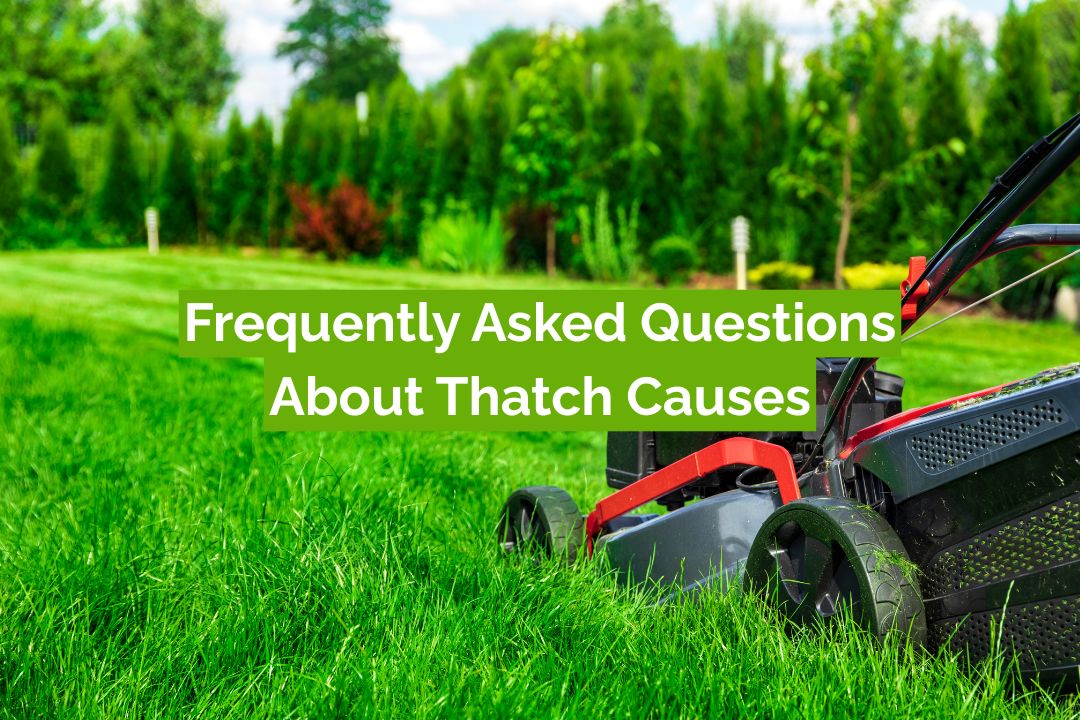A healthy lawn breaks down what it grows, but when it doesn’t, you get thatch.
Understanding what causes thatch and the causes of thatch buildup helps you stop it before it turns into a problem. From compacted soil to fertilizer mistakes, here’s what really creates that layer and how to keep your grass breathing freely again.
Compacted Soil
Compacted soil or heavy clay forces grass roots to migrate up to the soil surface for air where they form a thick mat which becomes thatch when they die. When soil gets packed down, oxygen and moisture can’t reach the microbes that normally break down old roots and stems.
Aerating the lawn once a year helps loosen the soil and gives beneficial organisms space to work again.
Learn how to aerate your lawn
Too Few Soil Organisms
Soils that are low in organic matter and/or high in clay content or acidity will not have enough earthworms and decomposer microorganisms available to break down naturally accumulating thatch.
Earthworms and tiny soil organisms act like recyclers for your lawn, they feed on dead plant material and turn it into nutrients. When soil becomes too acidic or low in organic content, these helpers disappear, slowing natural decomposition.
See our guide on improving soil health
Too Much Fast-acting Fertilizer
Fast-acting fertilizers tend to acidify soil. Acidic soil (pH of 6.5 or below) repels earthworms and reduces soil microbial activity as well. This retards thatch breakdown. High-nitrogen fertilizers push grass to grow fast above ground but not below. That extra growth adds more stems and roots, and more material for thatch.
Using slow-release or organic fertilizers keeps growth steady and soil organisms active..
Overuse of Pesticides
Certain pesticides may cause thatch buildup by suppressing soil organisms, especially earthworms. Some fungicides may stimulate growth of grass roots and rootstocks, thus increasing thatch formation.
When beneficial insects and microbes are wiped out, old grass tissue lingers instead of breaking down.
Use targeted pest controls or natural remedies whenever possible to protect the soil life that keeps lawns healthy.
See natural pest control tips
Type of grass
Some grasses produce more stem tissue than others because they spread by runners, or stolons, which are more likely to build up a thick thatch layer. Cool-season examples are creeping red fescue, Kentucky bluegrass, and creeping bentgrass. Warm-season examples are Bermuda, zoysia, and St. Augustine grasses.
Creeping grasses spread quickly, creating dense mats that trap clippings and roots. Knowing your grass type helps you plan mowing and feeding routines that prevent buildup before it starts.
Other Hidden Factors That Speed Up Thatch
Sometimes it’s not one habit but a mix of small ones that make thatch worse.
Overwatering can drown soil microbes that decompose roots. Mowing too short leaves the surface exposed, drying out the top layer and encouraging new thatch to form.
And soil that’s either too sandy or too heavy with clay struggles to host the bacteria and worms that keep things balanced.
How to Prevent These Causes
Once you understand what causes thatch, you’re already halfway to preventing it.
Keeping soil loose, rich in life, and free from chemical stress helps slow thatch buildup naturally, but the full process deserves its own guide.
For practical steps on watering, aerating, and feeding your soil the right way, see our detailed page on Preventing Thatch
Frequently Asked Questions About Thatch Causes

What causes excessive thatch in lawns?
Excessive thatch forms when grass grows faster than it breaks down. Over-fertilizing, frequent watering, and compacted or acidic soil all slow decomposition.
When soil organisms can’t keep up, layers of dead roots and stems build up at the surface.
See our guide on Preventing Thatch to keep your lawn balanced.
Does overwatering cause thatch?
Yes. Too much water fills soil pores with moisture instead of air, starving the microbes that decompose organic matter. When that happens, old roots and stems pile up as thatch instead of breaking down naturally.
Does fertilizer cause thatch buildup?
Overusing nitrogen fertilizers can make grass grow too fast for the soil to handle. That extra growth leaves behind stems and roots that decompose slowly, forming a dense thatch layer. Use slow-release or organic fertilizers to keep growth steady and balanced.
Why does my grass have so much thatch?
Heavy thatch usually points to a few habits, overwatering, too much fertilizer, poor aeration, or compacted soil.
Sometimes even the grass type plays a role.
When decomposition slows, dead stems pile up faster than they break down.
How do you prevent thatch?
Keep soil active and balanced.
Aerate yearly, water deeply but not often, and fertilize lightly using organic matter instead of chemicals.
Avoid compacting the soil and limit pesticide use to protect the microbes that eat away at thatch.
How to get rid of thatch naturally?
Core aeration and light raking are the safest natural ways to remove thatch. Follow with a thin layer of compost to boost microbes that break down leftover debris. Skip harsh chemicals and let soil life do the work.
Conclusion
Thatch doesn’t appear overnight, it’s a result of how your lawn is managed. By recognizing what causes thatch and fixing the causes of thatch buildup, you’ll restore balance to your soil and prevent future issues naturally. Keep the roots healthy, and your lawn will take care of itself.

